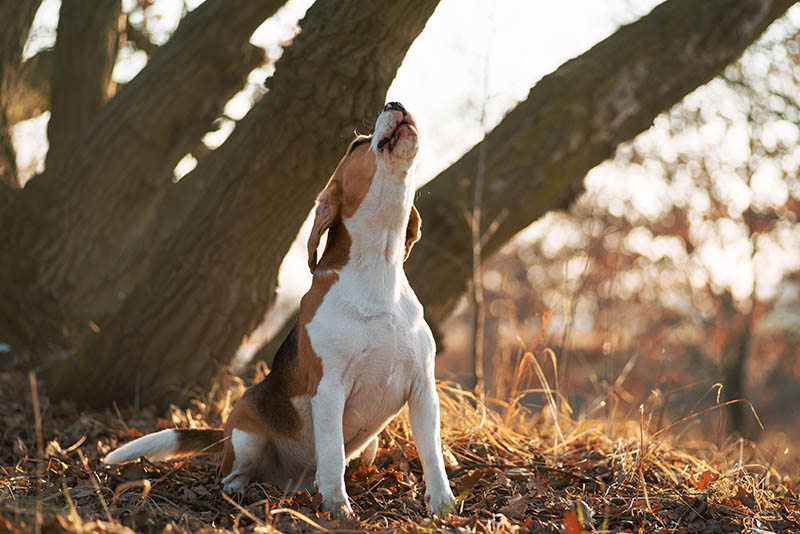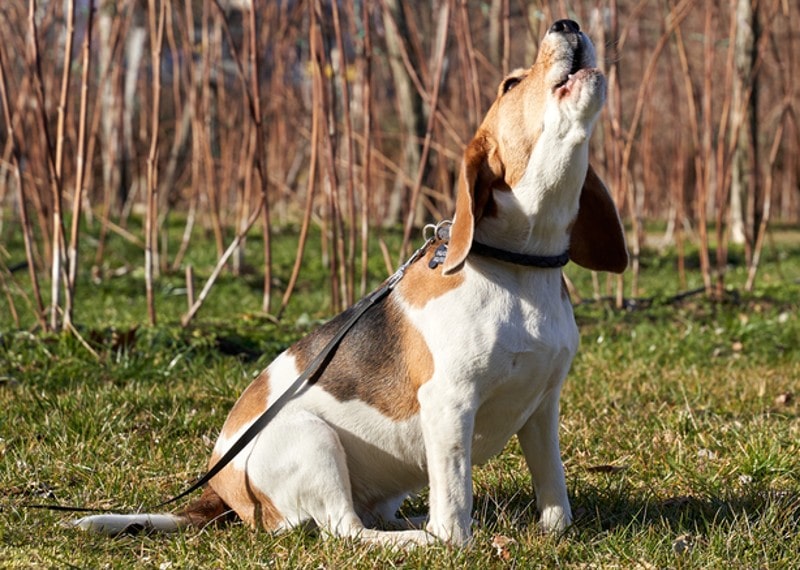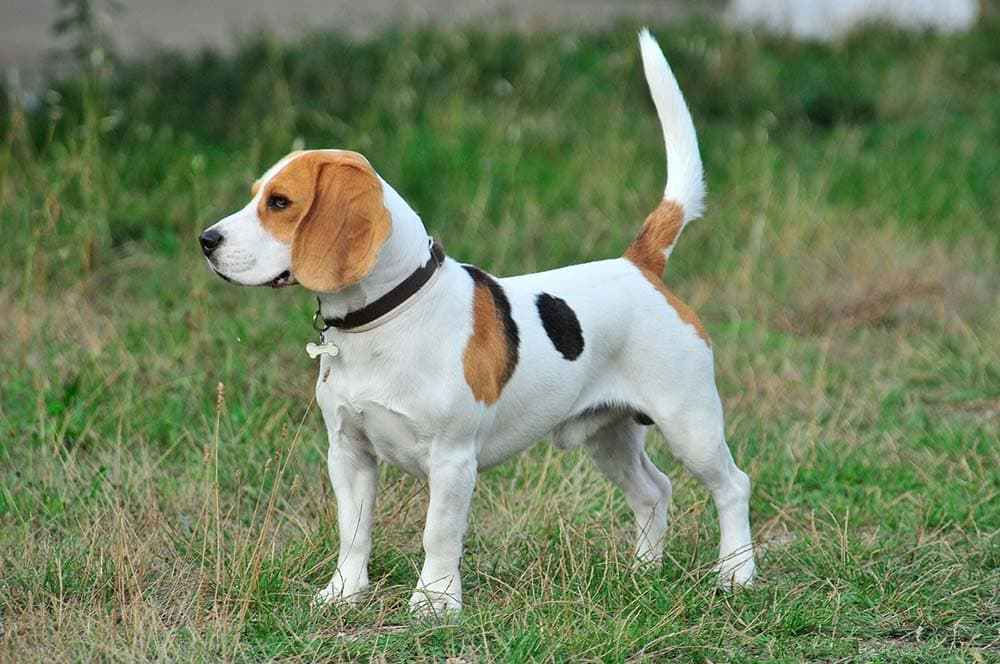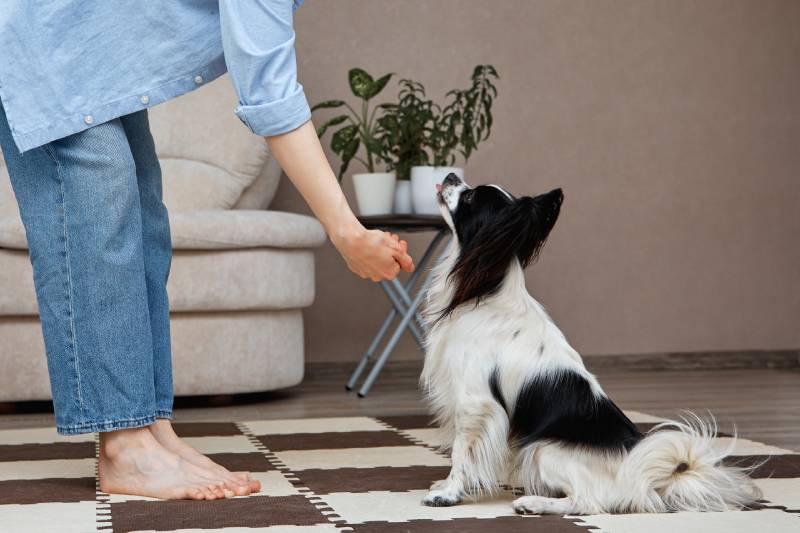Why Do Beagles Howl So Much? Top 7 Reasons
By Lorre Luther
Updated on

Beagles love to howl. Even the most laid-back, pampered beagle lets loose a good howl or two when the time is right. It’s a deeply ingrained part of the breed’s DNA, along with sharp noses and fantastic tracking skills. Beagles were originally hunting dogs taught to use their noses to find game and then to howl to signal a successful find—it’s how beagles were bred to interact with their environment.
Non-hunting beagles still have the same instincts as their hunting elders. Beagles howl more than other dogs because it’s an instinctive part of their breeding. But many things trigger beagles to howl, including being lonely or having found a fun scent. While all dogs howl, some breeds, including beagles and basset hounds, are more likely to do so. Keep reading to learn more about some of the most common beagle howling triggers.
Top 7 Reasons Beagles Howl:
1. They’re Anxious
Beagles are extremely social dogs, often developing separation anxiety if they spend too much time alone. Beagles don’t do well when left totally by themselves. Most are happiest in the company of at least one person, cat, or another dog. Beagles that start feeling lonely often become anxious and howl out of anxiety.
Howling is particularly common among dogs experiencing separation anxiety, a condition that occurs when a dog suffers a terrifying panic attack triggered by being left alone. No one is sure what causes dogs to end up with the condition, although it strikes some breeds, like Labrador retrievers and border collies, more often than others.
Certain events, including moving and introducing a new pet, are notorious for triggering canine separation anxiety. Dogs also often begin experiencing the condition after significant environmental upheaval, such as major changes in an owner’s schedule.
Dogs with separation anxiety often howl while their human is away, go to the bathroom in the home, destroy furniture, and damage windows during frantic escape attempts.
While it takes a bit of work, it’s possible to help dogs with separation anxiety get relief. Mild cases can often be addressed by convincing your pet to associate your departure with something enjoyable, like getting a treat. Dealing with more severe behavior often requires the help of a canine behavior therapist.
Speak with your vet sooner rather than later if your pet begins howling or barking excessively and demonstrating other stress-based behaviors when left alone. Separation anxiety tends to become worse if allowed to progress, and it rarely goes away on its own. Getting a dog suffering from separation anxiety into treatment as quickly as possible can limit symptom severity and shorten recovery time.

2. They’ve Sniffed out Prey
Hunting beagles used to help their owners find prey. Once they located the target, beagles were trained to howl to signal their location. Modern beagles still have the instinct to search out and investigate new scents to see if there’s potential for a good chase.
If a beagle gets a whiff of a cat, squirrel, or neighborhood dog, they’ll likely want to do some chasing, but in the absence of that being allowed, they will permit themselves a good howl to announce the presence of an attractive scent.
3. They’re Engaging in Pack Behavior
Beagles don’t like being alone, preferring to be surrounded by people, cats, or other dogs, as the company provides a comfortable packlike environment. Beagles react to the world with the mentality, needs, and communication patterns of pack dogs.
Beagles instinctively begin howling in response to hearing other dogs howl. In their hunting days, several beagles howling made more noise, making it easier for owners to find the pack. Once one dog in the environment starts howling, any beagles in the vicinity are sure to join in. These loving dogs aren’t very picky when it comes to this sort of supportive howling. They’ll happily get in on any howling action, even if a dachshund initiates it.
4. They’re Marking Territory
Beagles also often howl to make sure others appreciate the boundaries of their territory. They’ll howl in response to hearing a visitor approach the front door or the sound of a car parking in front of the house. It’s a beagle’s way of saying, “just so you know, I’m over here, and this territory has already been claimed.”
Dogs howl if they come across a scent indicating the recent presence of a competing animal to make sure it’s clear that the territory is already spoken for. They’ll also howl when approaching unfamiliar territory to ensure other animals aren’t taken unaware by the outsider’s presence.
Howling isn’t the only trick dogs use to tell others to keep out. They also mark their territory with urine to ensure other animals steer clear. Although the behavior is most closely associated with male dogs, female dogs are just as inclined to get in on the act. Most dogs stick to marking outside as a method for laying claim to a particular territory. Increased howling may be linked to stress if a dog is marking inside and vocalizing excessively.

5. They’re in Pain
Beagles sometimes howl when they’re in severe physical pain. Howling is often associated with fun activities like catching a scent, but it can also indicate that a beagle is injured. This sort of howling has a different tenor than normal howls; it’s instantly recognizable when heard.
These deep, anguished howls indicate that a dog is experiencing severe physical distress. Dogs also howl in pain if too much pressure is applied to a painful spot while being handled or petted. Dogs howling out of despair need to be seen by a veterinarian as soon as possible.
6. They’re Seeking Attention
Beagles are notorious for figuring out precisely how to drive you crazy until you stop what you’re doing and give them a bit of attention. They’ll follow you around, emitting nonstop howls until you can’t take it anymore.
It’s possible to train a beagle not to howl in an attempt to get your attention. While it often takes a bit of work, most dogs can learn not to howl as much and to stop the chorus on command. Beagles don’t do well when subjected to harsh criticism and punishment. They usually make the most progress when motivated through positive reinforcement.
Ignoring the noise when your beagle starts howling for attention and rewarding them for remaining or becoming quiet is a great way to get started on the path to reduced vocal contributions. It’s critical to pay no attention to attention-seeking howling, as even negative attention feeds the cycle and convinces your pet to keep doing what’s working.
7. They’re Reacting to Environmental Noise
Because these adorable dogs love to howl so much, it doesn’t take much to get them started. A loud noise a few blocks away or a truck backfiring is more than enough to encourage beagle participation in a canine sing-a-long. Some dogs even respond to music by howling along. These dogs are having fun and responding to what’s happening around them.
Dogs often howl in response to musical instruments and emergency sirens. It’s just part of being a dog! When dogs howl in response to these sorts of sounds and events, it’s often a way of engaging with the environment. Think of it as your dog’s way of saying, “I hear you!”
Some dogs, however, are sensitive to a specific noise, meaning they react quite intensely to one triggering sound, like emergency sirens. If you can determine precisely what’s getting your dog worked up, it’s possible to use desensitization and counterconditioning to help them become less anxious in the face of known stressors.
Final Thoughts
While most dogs howl under the right circumstances, beagles are one of those breeds with a reputation for serious racket-making. Beagles howl more than the average dog, partly because their behavior has been deeply bred into them. It’s how they were bred to interact with the environment.
Most beagles howl for predictable reasons; they have discovered an intriguing scent, are engaging in supportive howling, or are interacting with their environment by howling along with music or noise. Some dogs howl out of anxiety, and beagles are prone to separation anxiety when left alone for long periods.
Featured Image Credit: tetiana_u, Shutterstock












